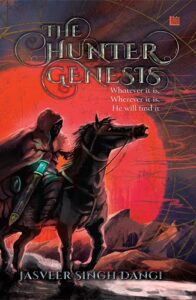Meet author Jasveer Singh Dangi. He has published 10 books and co-authored 2 books. He is based in Canada.

1. What experiences or influences inspired you to pursue a career in writing?
My father was a printing professional all his life and he was by far the biggest influencer for me. He is the one who, even though he was not there physically when I published my first book, motivates me to write every day. He was associated with the Government of India printing presses and had been posted at many sites across India. He was very well respected in his field. Since childhood I had seen him fiddle with printing machines, checking documents, and editing them. After retirement, he started his own printing press, which unfortunately failed but my brother and I were actively involved with him which left a lasting impression. For years, after closing the printing press, I never thought of doing anything related to printing or publishing but that all changed when my friend, Late Chetan Singh (God bless his soul), saw my journal and suggested that I should publish it. My journal took the shape of my first book Version One and Half (Version 1 ½) and rest is history. My only regret is that I couldn’t publish my books before my father left us (God bless his soul). Even though he’s not physically with me anymore, I know that he is always there with me.
2. Could you walk us through your writing process?
My writing process is very unorganized. I am not a disciplined writer so I can write anytime anywhere. I use devices at hand, be it a mobile phone or a tablet, to note my thoughts and then I transfer them to a Word file on my computer and create stories out of them. I am a keen observer of my surroundings and that helps me create my characters and situations for the stories. Most of the characters and their names in my books are inspired by real people and most situations in my books are real as well.
3. Do you follow any specific routines or rituals that help you stay focused and motivated?
No, I have no regular routine, my ideas can come anytime anywhere, sometimes at odd times at night. I just make sure to note them down before I lose the idea. When I say that I can write anytime, anywhere, I really mean it because my book The Metro-maniac Chronicles was entirely written while travelled in public transit back in India.
4. What challenges did you face while writing your book(s), and how did you overcome them?
The biggest challenge for an author is to create new ideas every time he or she picks up their pen. Every story must be different, unique and unheard of before and that is the biggest challenge for an author. With the increasing number of authors and mediums through which stories are conveyed these days, this is becoming increasingly difficult and similarities between different books is but obvious. I have overcome this by packaging my stories and books uniquely, be it designing or cover page or choosing the name of the book or the story in general. Every story of mine comes with a unique treatment or twist or angle, making my work very niche.
5. Which authors or books have had the greatest impact on your writing style, and what do you admire most about their work?
My biggest influence in the literary world, apart from my father, is Chetan Bhagat. I simply adore his books, and his writing style is what has always inspired me. Apart from him, I loved Jane Mitchel’s gritty novel ‘Chalkline’.
6. What essential skills do you believe are crucial for an author to succeed in their writing career?
A writer must be imaginative and willing to take risks. I believe that a combination of these 2 will make for an excellent author. The power of imagination will create great stories and the willingness to take risks will make them publish irrespective of what others think about their story. Some authors are not willing to take risks, and they stick to conventional stories belonging to only a certain genre but as per me a real author is the one who takes risk and writes something that is beyond conventional storytelling.
7. What does a typical morning look like for you?
My typical morning is a brain full of ideas and if I don’t note them immediately, I tend to lose the thought process and I feel as if there is a cluttering in my brain. I need to get the ideas out of my brain onto a paper or a file.
8. How do you like to unwind after a long day of work?
I am a part-time writer and a full-time trainer. My day starts with decluttering and getting the ideas from my brain to paper or a file and the same way my day ends with decluttering otherwise it goes to bed with me. During my typical training day, I meet many people, and the ideas keep cropping up, hence after I end my day I export the ideas out of my brain.
9. How do you prioritize self-care in your daily life?
I am very bad at self-care so I am not able to share any thoughts here.
10. Are there any habits or rituals that have greatly contributed to your productivity?
Meeting new people regularly helps keep my idea buds up and running.
11. In your opinion, what is the purpose of life?
We should live in the present and not worry about the future or rue about the past. Live one day at a time and worry less about tomorrow. Saying that, we must also understand that if today was amiss then there will be a new tomorrow as well. So, don’t worry too much if you missed something or failed, try again tomorrow. We dedicate our entire life praying to someone or something that isn’t even there and we ignore what is right in front of us, people, and nature. The real purpose of life is to live today to the fullest, respect everyone and value & protect what we have at hand.
12. What is the most important lesson you’ve learned in your journey so far?
Learning never stops and to be a successful author I must continuously learn and evolve.
13. How do you handle setbacks or failures, and what have they taught you?
I learnt this from my father, no matter how big the setback is, no matter how big a problem is, just smile and laugh it off. He could laugh in the most unusual of situations and I love him for that. Smiling and laughing during tough situations is what gets me through life’s toughest situations.


